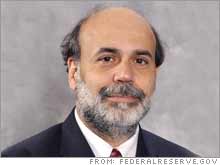|
Bernanke flexes his muscles Up in arms over his rate hikes and tough talk? Get over it. This is what a new Fed chairman does.
(FORTUNE Magazine) -- That Ben Bernanke. He keeps saying the wrong things. Again and again in recent weeks, the new Federal Reserve chairman's plainspoken words - in congressional testimony, in speeches, in a chat with CNBC anchor Maria Bartiromo at a Washington dinner - have moved markets, mostly downward.
But those on Wall Street who complain about Bernanke's bluntness and pine for the studied obfuscation of his predecessor, Alan Greenspan, are deluding themselves. Even the most silver-tongued Fed chairman couldn't keep markets calm right now. These are confusing times. Inflation is back - consumer prices rose 4.2% over the past 12 months, and at a 5.5% annual rate in May - but the economy is slowing. Will price increases slow too? Nobody knows. The measures we have of inflation are backward-looking and flawed, so controversy and monetary-policy errors are inevitable. And if errors are to be made, any new Fed chairman with half a brain would rather err on the side of being too tough on inflation. Which is exactly what Bernanke, after some initial confusion, appears to be doing. The big decision Bernanke and his colleagues on the Federal Open Market Committee face is when to halt the series of interest rate hikes begun by Greenspan (and Bernanke, who was a Fed governor from 2002 to 2005) two summers ago. When Bernanke took office in February, many on Wall Street assumed that the new chairman would be something of an inflation dove. That was a misconception. In decades of public utterances as a Princeton professor, Bernanke mostly toed the same line between hawkdom and the middle of the road that Greenspan did. But in a speech in November 2002, early in his first stint with the Fed, Bernanke approvingly mentioned a Milton Friedman parable about how a "helicopter drop" of cash could push prices upward. It was simply an attempt to reassure then-skittish markets that the Fed had ways to stave off deflation, but the image of a man willing to dump bills out of helicopters stuck. In hard-money circles, Bernanke is still known as "Helicopter Ben." The Bernanke Fed raised rates a quarter-point (to 4.75%) at his first meeting in charge in March. Then, in congressional testimony in April, he said the Fed might "take no action at one or more meetings, in the interest of allowing more time to receive information." His point was that inflation data were mixed and that a future pause in rate hikes shouldn't be read as anything more than an expression of uncertainty. But the financial media and the markets read the remark as a signal that the Bernanke Fed was about to stop boosting rates. Ever since, Bernanke has been trying to make his inflation-fighting intentions crystal clear. The Fed raised rates another quarter point in May, and after a series of hawkish speeches by Bernanke and other Fed officials, the betting among many economists is that the hikes won't stop until rates hit at least 6%. In response, stock markets around the world have swooned. Bernanke has taken a lot of heat for this. One frequent criticism is that "owners' equivalent rent," an estimate of the cost of owner-occupied housing that makes up 23% of the consumer price index, is distorting inflation upward even as house prices stall. It's one more indication of just how murky the inflation-measuring business is. But for a newly appointed Fed chairman, the course is pretty clear. Early on, both Greenspan and Paul Volcker embarked on rate-hiking campaigns that sent the economy into recession (and caused an incumbent President to be booted from office). Both came to be revered as defenders of stable prices. Which is surely more appealing than being known as Helicopter Ben. ----------------------------------- Related: Toothless Fed Related: Inflation's fear factor |
|

